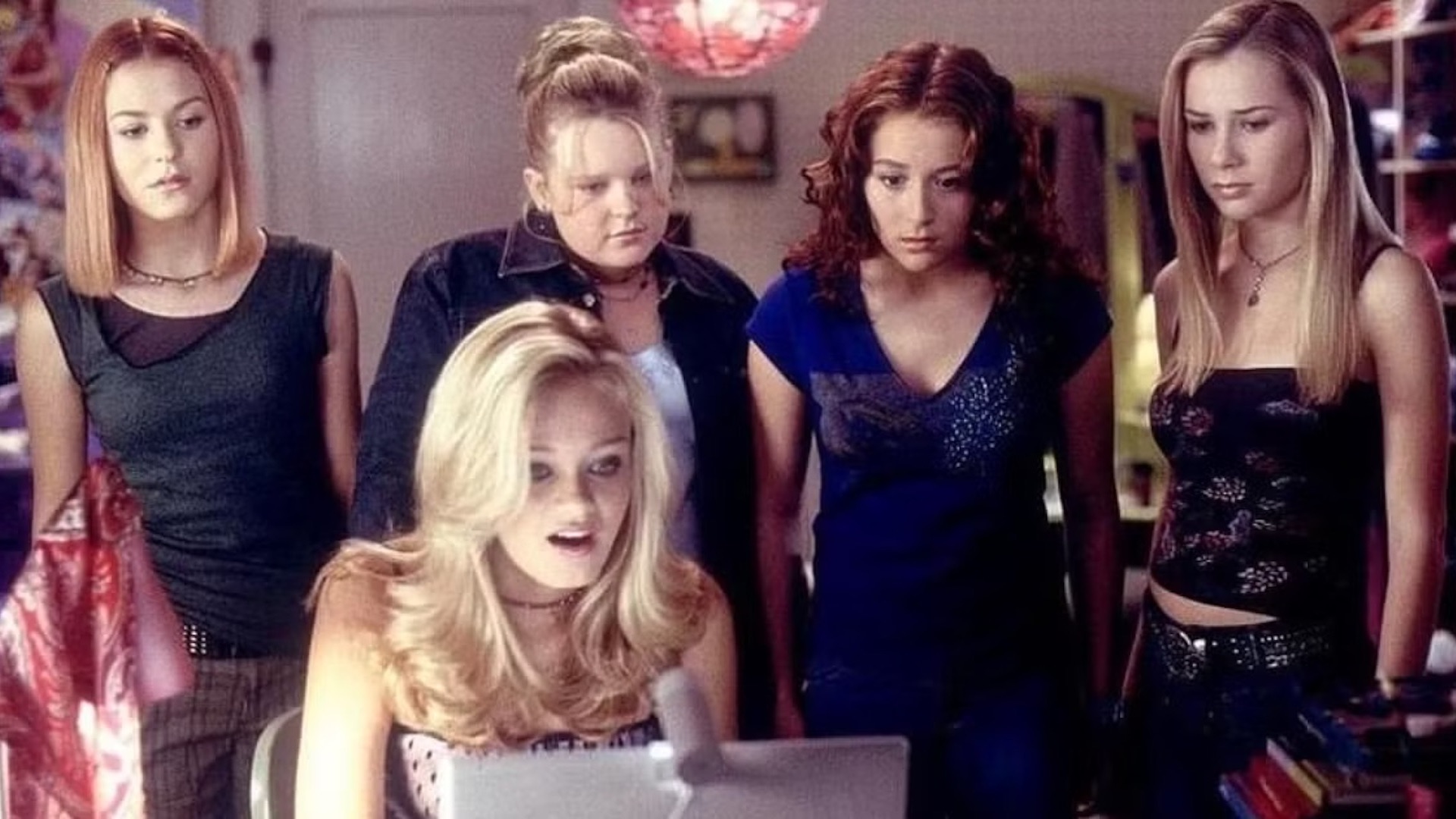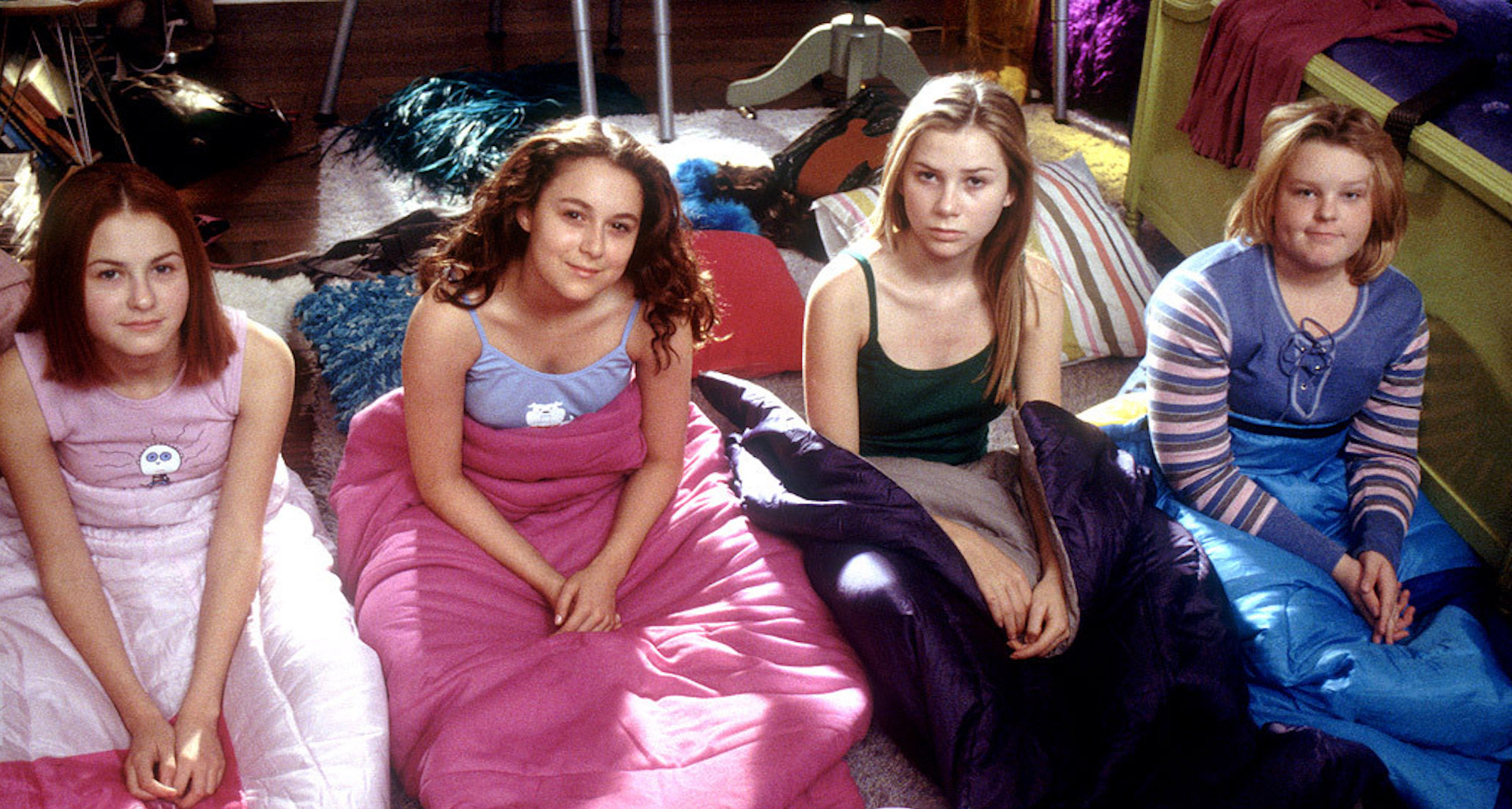If you grew up devouring stuffed crust pizza on a friend’s clothes-covered floor while watching The Parent Trap (which you may or may not have rented from Blockbuster — RIP), you probably assumed your kid would do the same someday. Maybe not the Lindsay Lohan version, despite it being a work of art, but undoubtedly some sort of spin-off. Lately, though, it’s looking like the classic childhood sleepover might be headed for extinction — Oreos + peanut butter and all.
A recent viral (and seemingly now deleted) tweet reignited the ever-contentious “to sleepover or not to sleepover” debate with a simple: “My daughter is not allowed to attend sleepovers. I hope someday she forgives me and knows it’s for the best.” Cue: quote tweets, TikTok commentary, and way more people than expected saying (or at least thinking) yeah, honestly, same.
So what gives? Clinical pediatric psychologist Dr. Melissa Giglio tells Betches, “Sleepovers are controversial because parents are concerned with what their kids are exposed to or influenced by outside their home.” In other words, the idea of sending your kid into someone else’s potentially unhinged household — now with smartphones! — is enough to make anyone second-guess.
Still, banning them altogether miiiight not be the perfect solution. “Kids don’t need sleepovers to build strong friendships,” says child psychologist Hannah Samaha, PhD, “but sleepovers are a cultural norm in many areas, and not allowing them could limit social connections.” Key words? Could and might, my friends.
So… are sleepovers officially canceled? Or are we just collectively spiraling over a tradition we haven’t figured out how to modernize? Let’s unpack our Barbie overnight bags together, shall we?
Wait, What’s the Problem With Sleepovers Now?

Letting your kid crash at someone else’s house used to be a no-brainer — you get some alone time, and they get to prank call random numbers and form lasting connections. Now, however, it’s a full-blown anxiety spiral. Are there weapons in the home? What are the tech rules? Who else is going to be there? Is someone’s weird older cousin visiting? With more awareness of safety risks and way less control over what kids might be exposed to (looking at you, TikTok), a lot of parents are rethinking the whole “sleepover” sitch altogether.
“Parents today worry about a range of concerns — from social media exposure to firearm access — many of which weren’t as pressing when they were kids,” says Dr. Samaha. And tbh, she’s right. We’re parenting in an era where everyone’s seen a Dateline episode or three.
According to Dr. Giglio, it’s totally valid to feel iffy about sleepovers when “the values and rules in the other family’s home regarding technology, supervision, or who’s even in the house are unknown or unclear.” Basically, it’s less about being a helicopter parent and more about not wanting to play roulette with your kid’s safety.
Also! The sleepover just might not fit into some families’ current lifestyles. “As my children get older, sleepovers rarely happen simply due to their other commitments, such as sports or other activities,” Dr. Giglio adds. Between early practices, nutrition goals, and an actual bedtime, sleepovers might not even make the cut anymore, risk aside.
Um, Sorry, Don’t Kids Need Sleepovers?
Okay, no one’s saying a childhood without sleepovers is automatically doomed. But as we all know, they’re kind of a big deal. For a lot of kids, late-night hangouts with friends are where the real bonding happens — the secrets spilled at 1 a.m., the gossip over mutual frenemies, the inside jokes that last a lifetime. It’s not about the sleeping part. It’s about the ~being there.~
“Friendships are a major protective factor for mental health, especially in adolescence,” says Dr. Samaha. “While sleepovers aren’t the only way to foster friendships, they can help strengthen bonds.” And yeah, not getting invited — or being the one who can’t go — can sting. “Your child could feel left out or begin to be excluded from events,” Dr. Giglio adds.
That said, no one is advocating for sending your kid to a stranger’s house and calling it character building. “It’s really about who is in your ‘village,’” says Dr. Giglio. If you trust the other parents, feel aligned in values, and have built a mutual understanding, sleepovers could work for you.
The annoying truth is that there’s no one-size-fits-all answer. I know. Ugh. But what works for one family might not work for another, so “Don’t judge parents for their choices,” Dr. Samaha notes. “Everyone makes decisions based on their own experiences and values.” Just maybe don’t plan your kid’s entire social life around slumber parties — and be cool about including kids who can’t always stay the night.
So…WTF Do We Do?
Honestly? There’s no perfect solution — just a bunch of slightly chaotic ones with varying levels of mental coordination. Whether you’re team “absolutely not” or “sure, under the right conditions,” most experts agree: a blanket policy probably isn’t the move. “It’s a case-by-case discussion,” says Dr. Giglio. “Would you be okay with them sleeping at their grandparents’ house? What about a close family friend? Or a camp sleepover?”
For some families, the answer is a hard no, but with creative alternatives. “It can help if a group of parents agrees on other ways for kids to bond,” says Dr. Samaha, like late-night playdates, weekend hangouts, or movie marathons that wrap by 10. And if you’re open to the idea of staying over? Dr. Samaha recommends the “yes, if…” approach: Yes, if you know and trust the family, if you’ve had clear conversations, and if expectations are set ahead of time.
Helpful sleepover tips:
- Talk to your kid early and often about safety and boundaries — without turning it into a Law & Order episode.
- Get to know the host family and don’t be afraid to ask “awkward” questions (yes, even the gun-in-the-home one).
- Offer alternatives if something doesn’t feel right, like coming home to sleep after the party or hosting the sleepover at your place instead.
Sleepovers don’t have to be all or nothing. Odds are you’ll feel some mom guilt either way (love that for us), so whatever you decide, make sure it’s something that works for your family — and maybe lets your kid feel a little less like a social pariah.
The TL;DR? Sleepovers aren’t dead, but the drop-your-kid-off-and-hope-for-the-best era? Very much over. Whether you’re Team Hell No or Team Let’s See How I Vibe With The Other Family, you don’t *necessarily* need a blanket ban — just a working strategy. As Dr. Samaha puts it, “Parenting isn’t about eliminating all risk — it’s about teaching kids how to assess and handle it.” So trust your gut, make your peace with the awkward texts, and do whatever helps you sleep at night (even if your kid won’t be sleeping at home).




















































